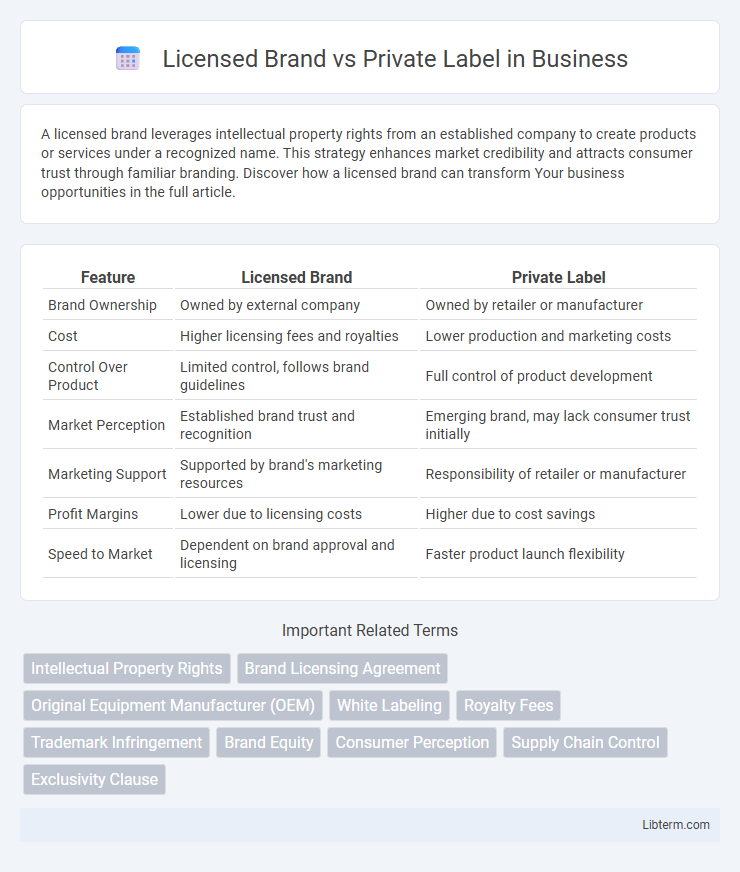A licensed brand leverages intellectual property rights from an established company to create products or services under a recognized name. This strategy enhances market credibility and attracts consumer trust through familiar branding. Discover how a licensed brand can transform Your business opportunities in the full article.
Table of Comparison
| Feature | Licensed Brand | Private Label |
|---|---|---|
| Brand Ownership | Owned by external company | Owned by retailer or manufacturer |
| Cost | Higher licensing fees and royalties | Lower production and marketing costs |
| Control Over Product | Limited control, follows brand guidelines | Full control of product development |
| Market Perception | Established brand trust and recognition | Emerging brand, may lack consumer trust initially |
| Marketing Support | Supported by brand's marketing resources | Responsibility of retailer or manufacturer |
| Profit Margins | Lower due to licensing costs | Higher due to cost savings |
| Speed to Market | Dependent on brand approval and licensing | Faster product launch flexibility |
Understanding Licensed Brands
Licensed brands refer to products or services produced by one company under the brand name of another company through a legal agreement, allowing the licensee to leverage the established brand's recognition and market presence. This strategy helps manufacturers enter new markets quickly and capitalize on consumer trust associated with the licensed brand. Understanding licensed brands involves recognizing the importance of brand equity, contractual obligations, and ensuring consistent quality aligned with the licensor's standards.
What Are Private Labels?
Private labels are products manufactured by one company but branded and sold under another company's brand name, typically a retailer's own brand. These products often offer competitive pricing and exclusive availability, allowing retailers to control product quality, branding, and profit margins more effectively. Private labels span various industries, including grocery, apparel, and electronics, appealing to cost-conscious consumers seeking value without compromising on quality.
Key Differences Between Licensed Brands and Private Labels
Licensed brands involve third-party trademarks or characters that enhance product appeal through established brand recognition, while private labels are retailer-owned brands manufactured specifically for a store. Licensed brands often require royalty payments and have strict guidelines on usage, whereas private labels offer retailers greater control over product design, pricing, and margins. The key differences lie in brand ownership, marketing strategy, and cost structure associated with product development and distribution.
Advantages of Licensed Brand Products
Licensed brand products leverage well-established trademarks and consumer trust, driving higher perceived value and brand loyalty. These products benefit from extensive marketing support and proven quality assurance, reducing consumer risk during purchase. Strong brand recognition often translates into premium pricing and wider retail distribution opportunities.
Benefits of Private Label Strategies
Private label strategies offer retailers higher profit margins by cutting out intermediaries and controlling production costs. These brands enhance customer loyalty through exclusive product offerings tailored to target market preferences, fostering repeat purchases. Private labels also provide flexibility in product development, enabling quick adaptation to market trends and consumer demands.
Cost Implications: Licensed vs Private Label
Licensed brands typically involve higher upfront costs due to licensing fees and royalty payments, impacting overall profitability. Private label products reduce expenses by eliminating these fees, offering greater control over production and pricing strategies. Lower manufacturing and marketing costs in private labeling often translate to higher margins and competitive retail pricing.
Brand Control and Ownership
Licensed brands involve a third party granting permission to use their established trademark, allowing the licensee limited brand control while ownership remains with the licensor. Private label products are created and owned by the retailer or manufacturer, offering full brand control and exclusive ownership. This distinction impacts marketing strategies, quality standards, and long-term brand equity management.
Market Positioning and Consumer Perception
Licensed brands leverage established market positioning and consumer trust by capitalizing on recognized trademarks and consistent quality, which often translate to higher perceived value and premium pricing. Private label products position themselves as cost-effective alternatives, appealing to price-sensitive consumers who prioritize functionality and value over brand prestige. Consumer perception typically aligns licensed brands with reliability and aspirational status, while private labels are viewed as practical choices with growing quality improvements in various retail segments.
Legal Considerations and Trademark Issues
Licensed brands involve legally binding agreements granting permission to use trademarks, requiring strict adherence to brand guidelines and royalty payments to avoid infringement. Private labels are owned and controlled by the retailer, allowing greater flexibility but necessitating thorough trademark searches to prevent unintentional violations. Both models demand clear contracts outlining trademark usage rights, quality standards, and dispute resolution mechanisms to mitigate legal risks.
Choosing the Right Approach for Your Business
Evaluating Licensed Brand and Private Label options depends on factors such as brand recognition, control over product development, and margin goals; Licensed Brands offer established market trust while Private Label allows customized branding and higher profitability. Businesses targeting rapid market entry and leveraging existing customer loyalty might favor Licensed Brands, whereas those seeking long-term differentiation and cost control often select Private Label strategies. Analyzing target audience preferences, competitive landscape, and investment capacity guides the optimal selection between these two branding approaches.
Licensed Brand Infographic

 libterm.com
libterm.com